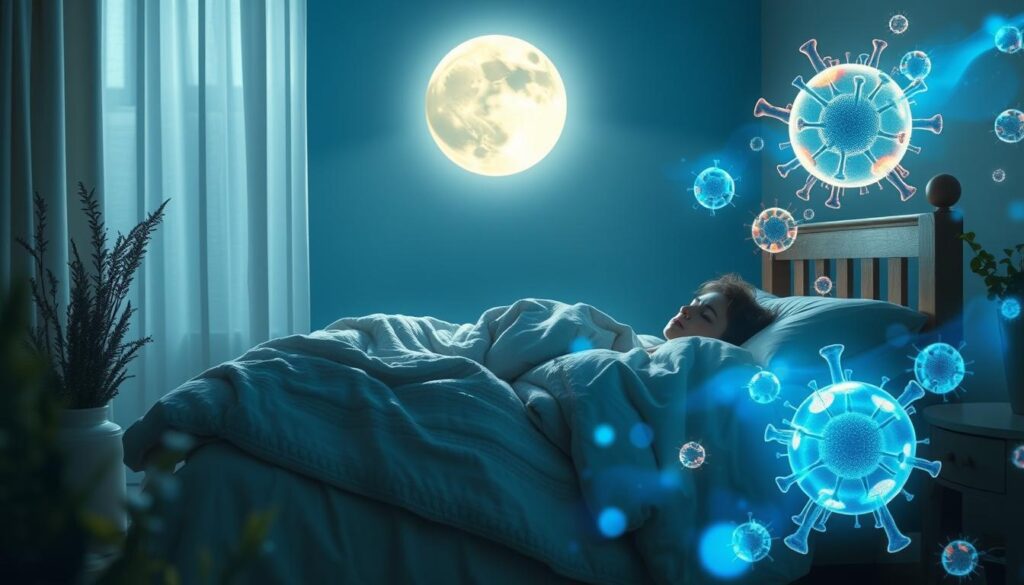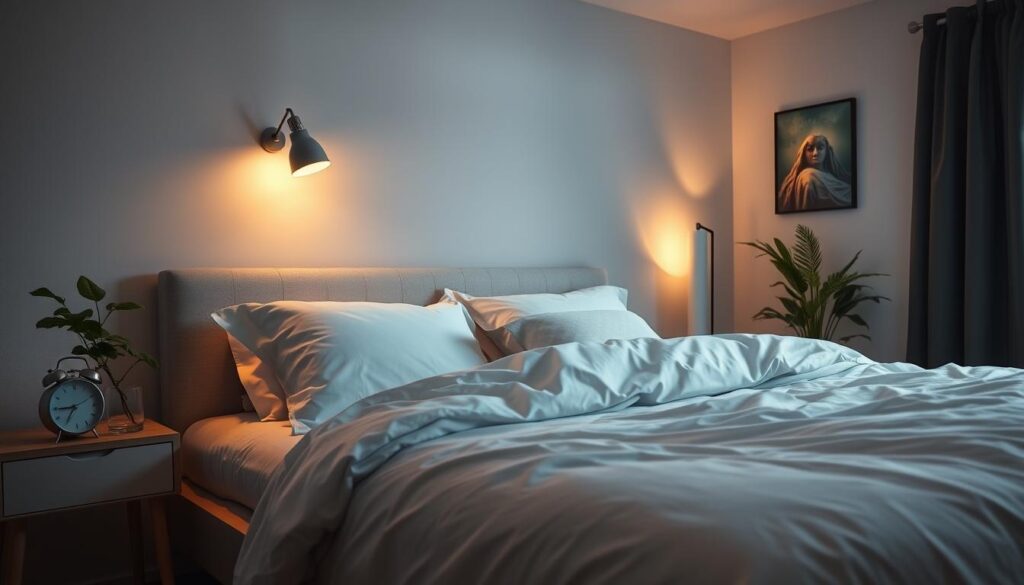Thinking about my sleep habits, I see how crucial it is for a healthy life. Adults need 7 to 8 hours of sleep each night1. I’ve learned that focusing on sleep greatly improves my health and well-being. Understanding sleep science helps me make better choices for my health sleep and sleep hygiene.
Studies show that not sleeping enough can lead to obesity and heart disease1. I’ve noticed how good sleep habits can lower these risks. By following sleep hygiene practices, I’ve bettered my sleep quality and reduced sleep disorder risks.
Key Takeaways
- Adults require at least 7 hours of sleep each night for optimal health2
- Prioritizing health sleep and sleep hygiene can help reduce the risk of obesity and heart disease1
- Consistent sleep-wake cycles are essential for promoting healthy sleep2
- Exercise has been found to improve sleep quality and ease the process of falling asleep2
- Well-rested individuals who receive the flu vaccine develop stronger protection against the illness1
- Lack of adequate sleep can reduce immunity and increase the risk of infection2
- Recovery from sleep deprivation can lead to improved mood, increased energy and attention, and enhanced feelings of well-being2
Understanding the Basics of Health Sleep
Sleep is crucial for our health and well-being3. It helps our body fix damaged cells, build bones and muscles, and boost our immune system4. The sleep we need changes as we age. Newborns need 14-17 hours, and adults need 7-9 hours5.
A sleep cycle has non-REM and REM phases, lasting 90-120 minutes4. The first cycle is the shortest, lasting 70-100 minutes3. Understanding these stages helps us see why good sleep is key for our health and rhythm.
- Sleep accounts for 25-33% of the human lifespan3.
- Not enough sleep can weaken our immunity, increase obesity risk, and raise stress levels5.
- Quality sleep isn’t just about how long we sleep but also how refreshing it is5.
Learning about healthy sleep helps us improve our sleep quality. This is vital for keeping our circadian rhythm in check. It helps prevent sleep disorders like insomnia and ensures we get enough deep sleep4.
The Power of Circadian Rhythms
Our bodies have an internal clock that controls our sleep-wake cycles, known as circadian rhythms. This natural process is influenced by light and darkness. These factors can affect our rem sleep and overall sleep quality6. Disruptions in circadian rhythms can raise the risk of chronic diseases like diabetes and obesity6. It’s important to understand how our bodies respond to light and darkness to keep a healthy sleep pattern.
Circadian rhythms usually follow a cycle close to 24 hours for most people7. Body temperature rises during the last hours of sleep, making us feel alert when we wake up7. A small drop in body temperature happens between 2 p.m. and 4 p.m., making us feel sleepy in the early afternoon7. This natural temperature drop can influence our sleep disorders and overall health.
Keeping a regular sleep schedule is key to aligning with our circadian rhythms. This improves sleep quality and health outcomes6. Good sleep hygiene can also enhance sleep quality, impacting our overall health and recovery6. By grasping the power of circadian rhythms and their effect on sleep, we can foster healthy sleep habits. This can help reduce the risk of sleep disorders8.
| Sleep Stage | Duration | Effects on Body |
|---|---|---|
| REM Sleep | 90 minutes | Memory consolidation, emotional processing |
| Deep Sleep | varies | Physical restoration, immune function enhancement |
Your Brain on Sleep: Neural Processes and Recovery
When we sleep, our brains work hard to recover from the day. These efforts are key to keeping our sleep quality and patterns good. Studies show we need at least 7 hours of sleep each day for our minds and bodies to function well9. Sleep makes us think clearer, react faster, and focus better10.
During sleep, our brains process memories, emotions, and clean out toxins. These activities help us keep information, manage feelings, and get rid of brain waste. For instance, sleep helps clear out brain debris, especially the stuff that builds up between brain cells9. The glymphatic system, which removes brain toxins, also gets a boost during sleep9.
Here are some key facts about sleep and brain recovery:
- Sleep helps to consolidate memories and improve cognitive function10.
- Emotional processing during sleep helps to manage stress and anxiety11.
- Brain cleaning during sleep helps to remove toxins and waste from the brain9.
Sleep is vital for maintaining good sleep quality and patterns. By understanding how our brains work during sleep, we can improve our sleep and health.
| Sleep Stage | Duration | Brain Activity |
|---|---|---|
| Non-REM Sleep | 70-120 minutes | Slow brain waves |
| REM Sleep | 90-120 minutes | Increased brain activity |
Physical Restoration During Deep Sleep
Deep sleep is key for our body’s repair and growth. It helps us build bone, muscle, and boosts our immune system12. To get better sleep, we need to follow good sleep hygiene. This means keeping a regular sleep schedule and making our sleep space comfy.
Sleep is vital for our physical health, helping our body fix and grow tissues13. As we age, our deep sleep time changes, affecting our sleep quality13. Here are some important facts about deep sleep:
- Deep sleep happens early in the night and is crucial for fixing and growing tissues12.
- It helps clean our brain by removing waste through synaptic pruning12.
- Lacking REM sleep can lead to problems with learning, memory, and mood12.
By focusing on health sleep and good sleep hygiene, we can enhance our sleep quality. Adults need 7 to 9 hours of sleep each night for the best health12.

Remember, sleep is a big part of our health. By valuing sleep, we can boost our physical and mental health.
| Sleep Stage | Duration | Characteristics |
|---|---|---|
| NREM Stage 1 | 1-7 minutes | Rhythmical alpha waves at a frequency of 8-13 cycles per second13 |
| NREM Stage 2 | 10-25 minutes | Approximately 50% of the total sleep cycle later in the night13 |
| NREM Stage 3 | 20-40 minutes | Varies across cycles13 |
The Connection Between Sleep and Mental Health
Sleep is key to good mental health. Problems with sleep can really affect how we feel. Studies show that insomnia can make manic and depressive episodes worse in people with bipolar disorder14. Also, about 75% of people with depression have trouble sleeping14.
Anxiety disorders hit about 20% of adults and 25% of teens in the U.S. Chronic insomnia might make people more likely to get anxiety14. The American Academy of Sleep Medicine says adults should sleep at least 7 hours a night for best health15. It’s important to know that sleep issues can affect up to 25% of young kids. Screen time before bed can cut melatonin production by 20-30%, making it hard to fall asleep16.
To keep your mental health in check, make sleep a priority. Start by setting a regular sleep schedule. Also, make your sleep area calm and avoid exciting activities before bed. These steps can help you sleep better and lower the chance of getting anxiety or depression141516.
How Sleep Impacts Your Immune System
Sleep is key to our immune system’s health. Not getting enough sleep can weaken it17. Sleep and the immune system work together; sleep boosts immune function, and immune responses can impact sleep quality17. During sleep, our body makes more cytokines, which help fight off illness or injury17.
Studies show sleep helps our immune system remember and fight off pathogens18. Immune markers like T cells and cytokines are at their highest during early sleep18. Sleep also helps T cells move to lymph nodes, boosting our defenses18. Getting enough sleep is vital for our overall health, showing the harm of too little sleep on our immune system18.
Some important points about sleep and the immune system include:
- Sleep helps both our innate and adaptive immunity, making us stronger against germs17
- Not sleeping enough can harm our immune system, leading to sickness in the short and long term17
- Long-term sleep loss raises the risk of chronic diseases like diabetes and heart issues17

Sleep disorders can hurt our immune system by reducing sleep quality17. It’s crucial to value sleep and keep good sleep habits for a strong immune system18.
Sleep Disorders and Their Effects
Sleep disorders can greatly affect our health sleep. It’s key to know the common types and their signs. About one-third of adults have insomnia symptoms19. Also, around 70 million Americans deal with sleep disorders20.
Common sleep disorders include insomnia, sleep apnea, and restless leg syndrome. Insomnia makes it hard to fall or stay asleep. It can be short-term, ongoing, or keep coming back19. Sleep apnea causes breathing pauses during sleep, lasting 10 seconds or more21.
Knowing the signs of sleep disorders is important. Look out for too much daytime sleepiness, trouble focusing, and mood swings. If these signs don’t go away, getting help is crucial. This can stop serious health issues, like heart disease20.
By focusing on health sleep and tackling sleep disorders, we can feel better. This includes getting better deep sleep.
To handle sleep disorders, set a regular sleep schedule. Make your sleep area calm and avoid exciting activities before bed. Taking these actions and getting help when needed can lead to better health sleep. This improves our deep sleep and overall health.
Optimizing Your Sleep Environment
To get better sleep, focus on sleep hygiene like keeping a regular sleep schedule and a dark, quiet room22. This helps control melatonin levels, which are influenced by light. A cooler bedroom, around 65 degrees Fahrenheit, can also boost sleep quality for about 70% of people23.
Here are some tips for a better sleep space:
- Use blackout curtains or eye masks to block out light
- Do regular exercise to enhance sleep duration and quality
- Limit caffeine in the afternoon and evening to avoid sleep problems
These steps can cut down on sleep disruptions and enhance sleep quality23.
Also, making your sleep area more sleep-friendly can help, as the second source shows23. Try to reduce noise, use white noise machines, and add calming scents like lavender. By focusing on sleep hygiene and a good sleep environment, we can wake up feeling better and more refreshed.

The Role of Lifestyle in Sleep Quality
Our lifestyle choices greatly affect our sleep quality. It’s key to make smart choices for better sleep. Eating well, exercising regularly, and managing stress can help improve sleep and keep our body clocks in sync24.
Exercise, especially in the morning, helps sleep quality by aligning our body clocks24. Diet also matters a lot for sleep. Eating more fiber can lead to deeper sleep, while too much sugar or fat can hurt it24.
Drinking too much sugar, caffeine, or alcohol at night can disrupt sleep24. Stress management, like meditation or deep breathing, can also help by lowering stress levels24. Avoiding screens and bright lights before bed can also enhance sleep quality24.
By making these lifestyle changes, we can improve our sleep and overall health. This is crucial since about 50 to 70 million US adults struggle with sleep disorders or don’t get enough sleep25.
Conclusion: Making Sleep Your Health Priority
Sleep is key to our health and happiness26. Kids need nine hours, teens eight to ten, and adults seven26. Good sleep keeps us physically and mentally strong.
Not enough sleep weakens our immune system and messes with hormones27. It also hurts our brain and raises the risk of serious diseases27. But, enough sleep helps our bodies heal and grow.
Many things can mess with our sleep, like insomnia and sleep apnea26. But, we can improve our sleep by following good habits, managing stress, and getting help when needed26.
By focusing on sleep, we can boost our health and happiness2627. This leads to a better life.
FAQ
What is the importance of sleep for our overall health?
Sleep is key to our health, affecting both body and mind. It helps our brains and bodies repair and refresh. This makes sleep essential for our health and how well we function.
What happens during the different stages of sleep?
Our bodies go through four sleep stages: light, deep, and REM sleep. Each stage helps with memory, emotions, and brain cleaning.
How do circadian rhythms affect our sleep patterns?
Our circadian rhythms control our sleep-wake cycles. They’re influenced by light and darkness. Disruptions can cause sleep disorders.
What are the cognitive and emotional benefits of getting quality sleep?
Good sleep boosts our brain and emotions. It helps our brains process info, store memories, and manage feelings. This is vital for our mental sharpness.
Why is deep sleep important for physical health?
Deep sleep helps our bodies repair and grow. Good sleep hygiene, like a regular schedule and a quiet room, improves deep sleep quality.
How are sleep and mental health connected?
Sleep and mental health are closely tied. Sleep issues can harm our mental state. Fixing sleep problems can help with anxiety and depression.
What is the relationship between sleep and the immune system?
Sleep boosts our immune system by removing toxins and making cytokines. Poor sleep weakens our immune system. So, quality sleep is crucial for health.
What are some common sleep disorders, and when should someone seek professional help?
Common sleep issues include insomnia, sleep apnea, and restless leg syndrome. If you have ongoing sleep problems, seek help. A professional can find the cause and treat it.
How can optimizing your sleep environment improve sleep quality?
A good sleep environment helps a lot. Keep a regular sleep schedule, a dark room, and avoid bedtime activities. These steps help your body adjust to sleep better.
How do lifestyle factors, such as diet, exercise, and stress management, impact sleep quality?
Our lifestyle affects our sleep. Diet, exercise, and managing stress can change our sleep patterns. Making smart choices in these areas can improve sleep.
Source Links
- The Benefits of Slumber – https://newsinhealth.nih.gov/2013/04/benefits-slumber
- Physical Health and Sleep – https://www.sleepfoundation.org/physical-health
- The Science of Sleep: Understanding What Happens When You Sleep – https://www.hopkinsmedicine.org/health/wellness-and-prevention/the-science-of-sleep-understanding-what-happens-when-you-sleep
- Controlled ZZZs – https://my.clevelandclinic.org/health/body/12148-sleep-basics
- About Sleep – https://www.cdc.gov/sleep/about/index.html
- Exploring the Role of Circadian Rhythms in Sleep and Recovery: A Review Article – https://pmc.ncbi.nlm.nih.gov/articles/PMC11221196/
- Circadian Rhythms – https://www.uclahealth.org/medical-services/sleep-disorders/patient-resources/patient-education/circadian-rhythms
- Sleep and circadian rhythms: pillars of health—a Keystone Symposia report – https://pmc.ncbi.nlm.nih.gov/articles/PMC8688158/
- The Neuroprotective Aspects of Sleep – https://pmc.ncbi.nlm.nih.gov/articles/PMC4651462/
- Brain Basics: Understanding Sleep – https://www.ninds.nih.gov/health-information/public-education/brain-basics/brain-basics-understanding-sleep
- What Happens When You Sleep? – https://www.sleepfoundation.org/how-sleep-works/what-happens-when-you-sleep
- What happens when we sleep, and why we need just the right amount each night – https://www.heart.org/en/news/2023/03/16/what-happens-when-we-sleep-and-why-we-need-just-the-right-amount-each-night
- Physiology of Sleep – StatPearls – https://www.ncbi.nlm.nih.gov/books/NBK482512/
- Mental Health and Sleep – https://www.sleepfoundation.org/mental-health
- How Sleep Deprivation Impacts Mental Health – https://www.columbiapsychiatry.org/news/how-sleep-deprivation-affects-your-mental-health
- Sleep and mental health – https://www.mentalhealth.org.uk/explore-mental-health/a-z-topics/sleep-and-mental-health
- Sleep & Immunity: Can a Lack of Sleep Make You Sick? | Sleep Foundation – https://www.sleepfoundation.org/physical-health/how-sleep-affects-immunity
- Sleep and immune function – PMC – https://pmc.ncbi.nlm.nih.gov/articles/PMC3256323/
- What are Sleep Disorders? – https://www.psychiatry.org/patients-families/sleep-disorders/what-are-sleep-disorders
- Sleep disorders – Symptoms and causes – https://www.mayoclinic.org/diseases-conditions/sleep-disorders/symptoms-causes/syc-20354018
- Sleep Disorders | MedlinePlus – https://medlineplus.gov/sleepdisorders.html
- Bedroom Environment: What Elements Are Important? – https://www.sleepfoundation.org/bedroom-environment
- Mastering Sleep Hygiene: Your Path to Quality Sleep – https://www.sleepfoundation.org/sleep-hygiene
- Sleep Better With Healthy Lifestyle Habits – https://www.heart.org/en/healthy-living/healthy-lifestyle/sleep/sleep-better-with-healthy-lifestyle-habits
- Sleep Duration and Quality: Impact on Lifestyle Behaviors and Cardiometabolic Health: A Scientific Statement From the American Heart Association – https://pmc.ncbi.nlm.nih.gov/articles/PMC5567876/
- Good Sleep for Good Health – https://newsinhealth.nih.gov/2021/04/good-sleep-good-health
- The impact of making sleep a top priority | Parkview Health – https://www.parkview.com/blog/the-impact-of-making-sleep-a-top-priority
